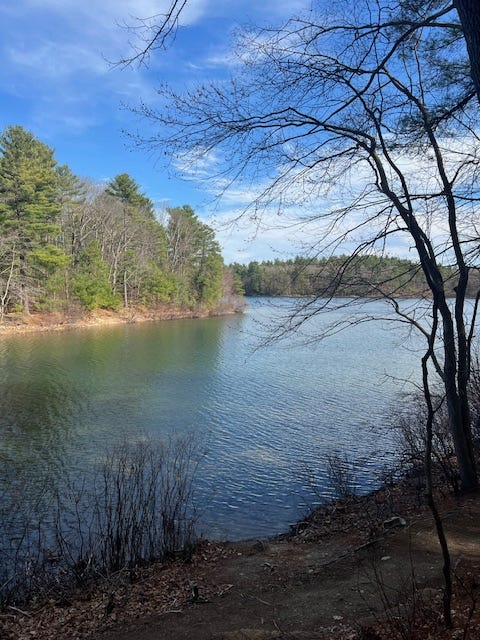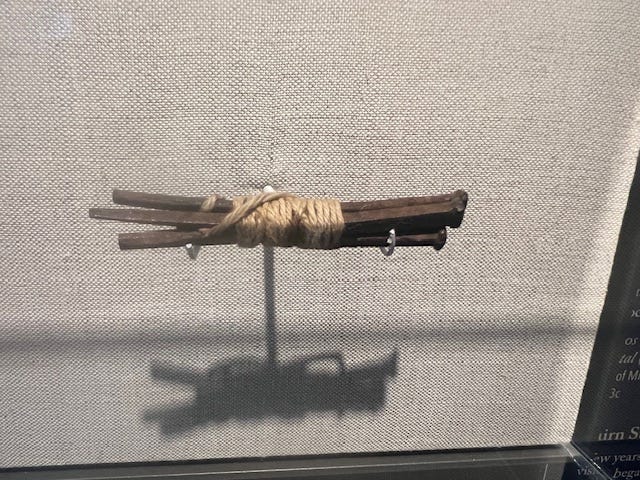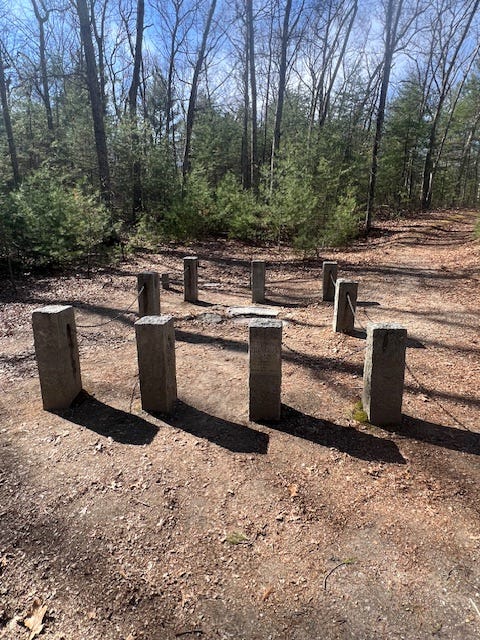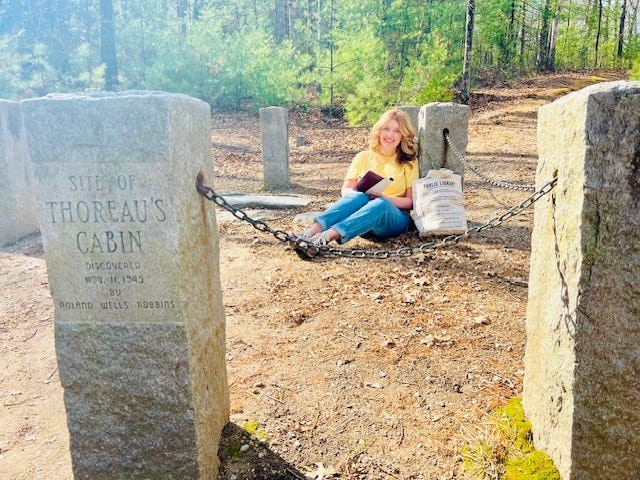
Hey Readers!
It’s that time again! I’m so excited to share with you this month’s Rebel Writer pick: Henry David Thoreau.
Thoreau remains one of America’s most influential 19th century writers. Best known for Walden, or Life in the Woods, he captured the imagination of generations with his reflections on nature, simplicity, and personal freedom. His time at Walden Pond wasn’t just an experiment in living deliberately, it was an invitation to all of us to slow down, pay attention, and ask ourselves: what really matters in this life?
This past spring, after reading Walden, I took the trip to Concord, Massachusetts, where I explored the Concord Museum, walked along Walden Pond, and stood at the site of Thoreau’s once cabin. The sky was a brilliant blue; the sun sparkled on the water, and birdsong filled the air. I could feel the magic of this place, and understood why Thoreau was drawn to it.
Thoreau is my 5th cousin 6x removed. We share the same 9th great grandparents, Experience Mitchell and Jane Cooke. I also like to think we share a bit of that same independent spirit.
Here are just a few inspiring facts I took away from my trip:
Born in Concord on July 12, 1817, Thoreau came into the world as David Henry Thoreau. He was named after a recently deceased uncle. He later flipped his first and middle names, going by Henry David instead because most people called him Henry. He was one of four siblings. He had both an older sister and brother (Helen and John) and one younger sister (Sophia).
While the Thoreau family had a middle class status due to the pencil factory his father ran, his mother often took in boarders to help support the household. Eventually, the pencil-making business offered some stability. Thoreau later ran the factory after his father’s death.
At the age of 16, Thoreau entered Harvard, thanks in part to the support of his two older siblings who helped cover his expenses (estimated to be $179 a year at that time. Imagine!). He studied classics, history, and philosophy. It was here that he also first encountered the writings of Ralph Waldo Emerson, who would not only shape his thinking, but his life in profound ways.
Thoreau tried many jobs. He was a teacher, handyman, laborer, pencil maker, and land surveyor. His first teaching position only lasted a few weeks. He was let go when he refused to use corporal punishment (good for him!). He did teach again as he ran a school of his own with his brother John from 1838 to 1841. It was a canoe trip in 1839 inspired Thoreau to devote himself to becoming a poet of nature.
Emerson’s influence on Thoreau was life changing. He encouraged Thoreau to keep a journal, welcomed him in his home, and even hired him as a handyman. Ultimately, he lent Thoreau the land at Walden Pond, where Thoreau would embark on his greatest adventure: building his famous cabin.
On July 4, 1845, at the age of 27, Thoreau moved into that cabin at Walden Pond, claiming he wanted to “front only the essential facts of life.” For two years, two months and two days after, he lived dimly, spending his days reading, writing, tending a bean garden while observing the natural world. Though there are some that argue he wasn’t exactly roughing it (he often walked into town for a hot meal at the end of the day), I’d say he had the best of both worlds. He spent his days philosophizing and writing in the woods and still got to enjoy a nice, warm meal after all that thinking.
Thoreau cherished having direct experiences with nature. He did, however, treat himself to an $8 spyglass to better study birds and other wildlife.
Thoreau also played the flute! Calling it “unpremeditated music”, he is quoted to have said the following:
“I sailed on the north river (the Assabet) last night with my flute-and my music was a tinkling stream which meandered with the river-and fell from note to note as a brook from rock to rock . . . Unpremeditated music is the true gauge which measures the current of our thoughts-the very undertow of our life’s stream.” Here are some pics of his engaged flute and the original furnishings of his cabin:
9. Thoreau did not know the literary success he would later turn out to be. In fact, he paid to print A Week on the Concord and Merrimack Rivers himself, and after poor sales, the unsold copies were returned to him, all 700 copies dropped on his doorstep. Walden found a wider audience but still took five years to sell 2,000 copies.
10. In 1846, Thoreau was jailed for refusing to pay a tax that funded the Mexican-American War-an act of protest that inspired his landmark essay, Civil Disobedience. This essay would later influence figures such as Gandhi and Martin Luther King Jr. in the fight against unjust laws.
After Thoreau’s death in 1862, those who admired him gathered remnants of his life, including wood scraps, nails to his cabin, and even pieces of the cabin as keepsakes. Bronson Alcott (Louisa May Alcott’s father), along with others, created a stone cairn marking the houses’ former location.
Here are some more pictures including Thoreau’s original desk, his cabin site, and a recreation of his cabin.
There is so much more to Thoreau to explore, including his philosophies, his failed proposal to Ellen Sewall, and his fight against slavery. Stay tuned for Rebel Writer’s Volume II, coming later this year in which I will explore his life in further depth.
CONCLUSION
Thoreau is a powerful reminder of the power of simplicity and what it means to slow down and notice the world around you. In a world infused with technology, he invites us to visit nature, reminding us of the quiet patterns of the natural world, fueling our creativity and ability to form our own thoughts, not those embedded into us form the noise of social media, television and other interferences. Make sure to take time to center in on the natural world. It’s important for your mind, heart and spirit!
I can’t wait to share more with you. Until then, you can always be inspired with Rebel Writers Volume I. I’ll also leave you with one of my favorite Thoreau quotes:
“You must live in the present, launch yourself on every wave, find your eternity in each moment. Fools stand on their island of opportunities and look toward another land. There is no other land; there is no other life but this.”
Sarah Crowne
AKA A Busy Lady
P.S. I am taking a bit of a social media break as I work on editing my next YA Thriller and, like Thoreau, I need some time in nature to pause and reflect. I did want to share this wonderful review I recently received for the audio version of All These Threads of Time! I love hearing from readers. Check it out!
And if you read and enjoyed ATTOT, please don’t forget to leave a book review. It helps other readers find the story. Thanks in advance!
In other news: I’ve got some new events lined up including three new Barnes & Noble signings from Portland, Maine to Connecticut starting in August. Head over to my website to see what’s coming next!
© 2025 WHATS GOIN ON?! SLN Publishing LLC, ALL RIGHTS RESERVED
A Busy Lady is written by an actual human—no AI, just chocolate, creativity, and a love for storytelling. This also means there may be an occasional typo, just to prove a human did it ;)

















